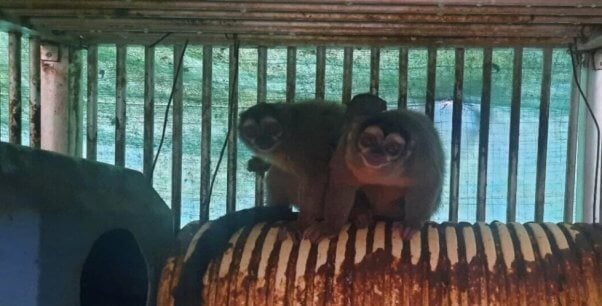NIH Invites Colombian Monkey Experimenters Under Criminal Investigation to Apply for Funding, PETA Reveals
For Immediate Release:
February 6, 2025
Contact:
Tasgola Bruner 202-483-7382
PETA has obtained correspondence showing that the National Institutes of Health (NIH) has invited the Caucaseco Scientific Research Center to apply for more taxpayer funding, despite previously cutting off the Colombian facility after a PETA exposé spurred a criminal inquiry and uncovered serious violations of animal welfare laws and other local regulations.
PETA’s investigation also resulted in the retraction of one paper by the facility’s directors and expressions of concern on four more, one of which was co-authored by an NIH scientist.
In a July 26, 2023 letter to a member of Congress, NIH said funding to the center was stopped. But in a March 2024 email with Sócrates Herrera, the center’s founder and director, NIH says Hererra may apply for future funding, and also that he will no longer have to return the center’s costs related to experiments on animals, which were performed illegally.PETA obtained the correspondence through a Freedom of Information Act request.
PETA’s investigation revealed that experimenters confined monkeys in filthy conditions, left them to die from infected wounds, and withheld adequate food for mice, forcing the stressed animals into cannibalism, while collecting more than $17 million in U.S. taxpayer money. Years of experiments and U.S. funding failed to produce the effective malaria vaccine for humans they were supposed to develop. PETA also uncovered that the facility captured monkeys, experimented on them, and conducted clinical trials with humans without the required permits.
In response, Colombian environmental authorities fined Caucaseco more than $180,000. Local law enforcement also rescued from the decrepit laboratory 108 monkeys and 180 mice, some of whom suffered from chronic, unattended conditions that led to their deaths a few days following their rescue. The facility was officially shut down last year.
Herrera and his wife founded Caucaseco, installing themselves and their three underage children—the youngest of whom was 12 years old—as the sole members of its board of directors.

In response to PETA’s investigation, Reps. Troy Nehls (R-Texas-22) and Dina Titus (D-Nev.-01) reintroduced the Cease Animal Research Grants Overseas (CARGO) Act, which would ban NIH from funding foreign experiments on animals. Reps. Eleanor Holmes Norton (D-DC), Young Kim (R-Calif.-40), Brian Fitzpatrick (R-Pa.-01), Don Davis (D-N.C.-01), and Nicole Malliotakis (R-N.Y.-11) have cosponsored the CARGO Act.
“NIH must be prevented from funneling taxpayer dollars into the pockets of apparent animal-abusing grifters like Sócrates Herrera,” says PETA Senior Vice President Kathy Guillermo. “NIH clearly can’t be trusted to make decisions about taxpayer money, which is why PETA urges everyone to contact their representatives and push the passing of the much-needed CARGO Act.”
Between 2011 and 2021, NIH gave $2.2 billion in taxpayer money to laboratories in South America, Europe, Asia, and Canada. NIH requirements for foreign animal experimenters are much weaker than for those in the U.S., and the agency has no effective oversight mechanisms to ensure that foreign laboratories comply with even basic animal welfare standards and relevant local regulations.
Note: PETA supports animal rights, opposes all forms of animal exploitation, and educates the public on those issues. PETA does not directly or indirectly participate or intervene in any political campaign on behalf of or in opposition to any candidate for public office or any political party.
PETA—whose motto reads, in part, that “animals are not ours to experiment on”—points out that Every Animal Is Someone and offers free Empathy Kits for people who need a lesson in kindness. For more information, please visit PETA.org or follow PETA on X, Facebook, or Instagram.


